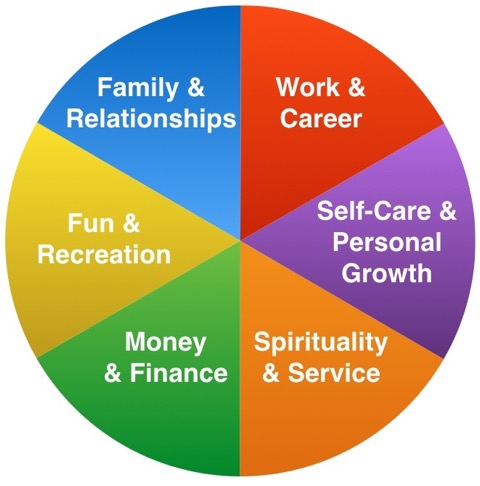We do not learn from experience
.
We learn from reflecting on experience.
--JOHN DEWEY
In 1904, Auguste Rodin debuted his
larger-than-life bronze casting of
The Thinker
. The French sculptor described his statue by saying, "The fertile thought slowly elaborates itself within his brain. He is no longer a dreamer, he is a creator."
Ironically, that same year, an American philosopher and educational reformer named John Dewey was shaping a revolutionary new way to think. He became the founder of the "Progressive Education Movement." In this participative learner-centered approach, Dewey discovered that intentional reflection on our own life-experiences creates "true learning" and new possibilities for the future.
Consider thinking about this past year to see how far you've come, what you've learned along the way, and how you envision the coming year. To jumpstart your review, the below graphic is a self-assessment tool often used in coaching called The Wheel of Life. The sections or wedges in the wheel represent different aspects of life. Feel free to adapt the categories and labels to better suit your life areas.

For each of the six sections in the wheel, reflect on the below topics and questions, plus any you wish to add:
1.
Satisfaction
: As you reflect on the past twelve months, how satisfied were you in each area of your life? You may want to peruse your calendar, photos, or journal to help recall the highlights and lowlights of the year. Ponder your overall experience with "Family & Relationships," "Work & Career," "Self-Care & Personal Growth," etc. Create a rating system that has meaning for you. For example, use a scale of 1-5 corresponding to "Not Satisfied," "Partly Satisfied," "Satisfied," "More than Satisfied," "Very Satisfied." Remember, this is a private personal rating of your own satisfaction levels (not how others may perceive or rate you in these areas).
2.
Successes
: For each section of the wheel, what did you accomplish this past year that pleased you the most? Think about your top achievements, milestones, and positive developments. Take time to list them. As you review the list, reflect on the joy, gladness, and sense of pride you felt (and still may feel) as a result of experiencing these good things. Consider for a moment how your efforts positively impacted your life and the lives of others. Congratulate yourself on a job well done.
3.
Strengths
: Next ask yourself, "What did I do to earn or attain these achievements? What personal traits, values, and skills enabled me to succeed? What actions and initiative did I take to yield these results?" In each section of the wheel, take an inventory of your major strengths. Celebrate these abilities and realize you are well equipped to create continued success in the coming year.
4.
Supporters
: Who helped you? Did others support, encourage, mentor, or inspire you? Consider expressing gratitude to the people who helped you accomplish the milestones listed above.
5.
Stressors
: As you reflect on the past year, did you experience
mental or emotional strain, which in turn caused
you dissatisfaction? Were there any notable setbacks, losses, regrets, disappointments, or failures? Could you have done anything differently to avoid them? In each section of the wheel, take an inventory of your major areas of opportunity. The point is not to blame or shame anything or anyone, but to simply observe the past year, reflect on what brought you dissatisfaction, and consider the role you play in creating new possibilities for the future.
6. Significance:
Finally, when you consider your overall satisfaction rating, successes, strengths, supporters and stressors, what important lessons did you learn? What significant discoveries did you make about yourself, personally and professionally? What do you want more of, or less of in the coming year? Are there any changes you would like to make to help ensure your optimal satisfaction in 2017? Some people call this commitment to improvement New Year's resolutions or goal-setting. John Dewey simply called it "true learning."
Over 2,000 years before Rodin sculpted
The Thinker
, or Dewey wrote his masterwork
How We Think
, Confucius advised, "Study the past if you would define the future." Please consider spending a few hours this holiday season reflecting on the past twelve months. The result of your efforts will likely be an even higher level of satisfaction and success in the coming year. To paraphrase Rodin, may we not only be dreamers, but also creators of the future we desire.
If you would like to learn more about self-development, communication skills, and presentation excellence, please read my book
Well Said! Presentations and Conversations That Get Results
(available in Hardcover, Kindle, and Audio).
Feel free to contact me directly to schedule an in-house corporate training event for your team. I would be honored to support your success.